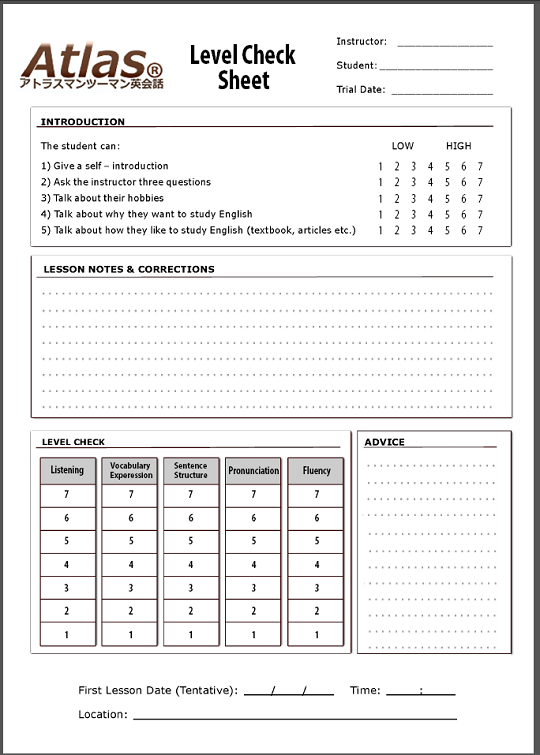- Student Admission Process
- Level Check System
- Curriculum and textbooks
- Lesson Place
- Policy
- Instructors and teaching environment
- Company infomation
- Requirement
- Application Form
- FAQ
- Sapporo Ekimae 【location here】
2500JPY(60min)
Click here for details - Sapporo Odori 【location here】
2500JPY(60min)
Click here for details - Online school E-atlas
in Sapporo Area【location here】
1950JPY(60min)
Click here for details

| Free Trial Lessons | Instructors are expected to use the Trial Lesson Curriculum for their trial lessons. Using this will clarify the flow of the trial lesson and provide some structure. Note: It may be necessary to cut trial lessons short if the student or staff member is running short on time. |
| 1.Introductions: (10min) | Please introduce yourself to the student. Talk about where you are from, how long you have been in Japan, your teaching experience, hobbies, etc. Next, have the student make a self-introduction. Ask about their English studies and encourage them to expand on what they say. Remember to provide useful feedback and correction to the student. Make sure that you discuss the student's needs. ATLASR is very goal-orientated, and it is important that you understand exactly what they wish to achieve in a determined time period. |
| 2.Textbook/Activity: (10min) | Japanese staff will give you information pertaining to the students level prior to the trial lesson. Please choose a textbook exercise, news article, or activity suitable for their level. Keep in mind that this part of the trial lesson is merely a sample lesson. The student just wants to see how you use teaching materials in your lessons. We recommend taking the first class or two to explore the student's needs in order to decide what textbook is best for the student. |
| 3.Elicited Speech: (5min) | This is the section where you can interact with the student and gain a better grasp of his or her English or other foreign language level. Give the student a topic and have them speak on that topic, asking them questions as they speak. For more advanced students you may want to prepare a news article to discuss. |
| 4.Scheduling: (5min) | Instructors are required to give the student a minimum of 24 hours notice for cancellation of a lesson. If the instructor is unable to give 24 hours notice, the following lesson shall be taught at half price or for an additional 30 minutes taught at no charge. Students are also required to give the instructor a minimum of 24 hours notice for cancellation of a lesson. If the student fails to give the instructor 24 hours notice, the student is required to pay for the cancelled lesson in full, payable at the next scheduled lesson. |
| Trial Lessons with New Students | Free Trial Lessons with new students will start with a Japanese staff member giving the student a thorough explanation of our two programs and listening to the students needs. They will arrive one hour earlier than the instructor. Then after the trial lesson, the Japanese staff member will counsel the student, so be careful to keep your trial lesson as close to 30 minutes as possible. Going over-time will cause scheduling problems. WARNING: Instructors who are late for trial lessons, cancel on the same day as trial lessons, do not bring appropriate teaching materials or display any other kind of unprofessional behavior will not be introduced to any other new students. |
Free Trial Lessons with existing students may be without a staff member present. Please exchange contact details (phone, email, cell phone email) and organize a tentative first lesson date.
Since there is no Atlas staff present at the time of trial lessons, instructors are required to contact Atlas Office to report the results of trial lessons and the tentative dates of first lessons if scheduled. It is very important to remember that first lessons scheduled with existing students will not be confirmed by Atlas. Instructors and their students are responsible for all later confirmations.
Atlas offers students a level check system through trial lessons.
The students level is categorized into 6 levels from beginner to advanced high.See the ATLAS original level chart below.(6 is the highest level)
| Level 6 | Can discuss about topics including media & cultures with effective use of idioms and colloquiums.Can communicate confidently and competently in well-structured language.Native-like usage. |
| Level 5 | Can discuss and express opinions about political & social issues as well as personal matters.Can be sensitive with sultural differences and have a sufficient command of the language to adapt appropriate formation. |
| Level 4 | Can have wide range of vocabulary, expressions and discourse ability to discuss matters related to his/her interests and professional field as well as formulating what he or she wants to express depending on situations. |
| Level 3 | Can explain in detail about him/herself in topics related to familiar everyday situations. Can deal with practical everyday demands in natural flow. Can have enough vocabulary & expressions to maintain conversations, but the language use is limited only in familiar expressions. |
| Level 2 | Can communicate in simple & routine tasks requiring simple & direct exchenge of information. Can have enough basic vocabulary & grammar to be understood in predictable everyday situations, likely to arise whilst travelling. |
| Level 1 | Can use simple, memorized phrase to greet or answer simple questions. Can follow short, simple direction. |




